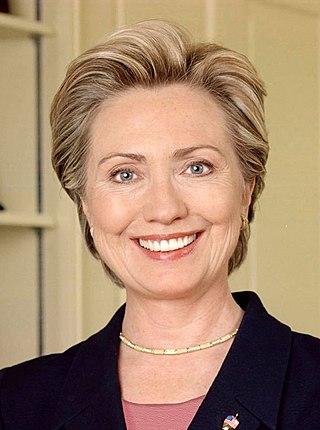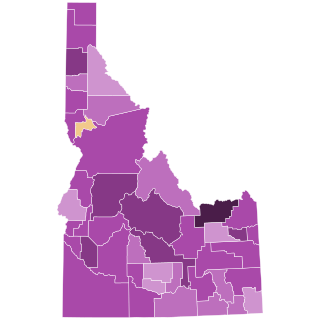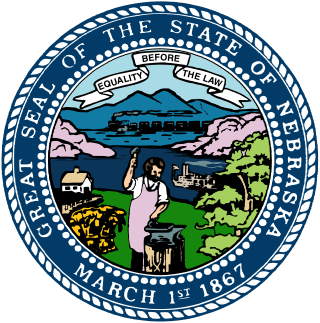
The Iowa caucuses are quadrennial electoral events for the Democratic and Republican parties in the U.S. state of Iowa. Unlike primary elections, where registered voters cast ballots at polling places on election day, Iowa caucuses are meetings where voters gather to discuss and select candidates for their registered party. Political parties hold the caucuses, in contrast to most state-run primaries. Both presidential and midterm elections in Iowa use caucuses. The caucuses are also held to select delegates to county conventions and party committees, among other party activities.
The Utah Democratic Party is the affiliate of the Democratic Party in the U.S. state of Utah. The party describes itself as a big tent party.

The 2008 Iowa Democratic presidential caucus occurred on January 3, and was the state caucuses of the Iowa Democratic Party. It was the first election for the Democrats of the 2008 presidential election. Also referred to as "the First in the Nation Caucus," it was the first election of the primary season on both the Democratic and Republican sides. Of the eight major Democratic presidential candidates, then-U.S. Senator Barack Obama of Illinois received the most votes and was ultimately declared the winner of the Iowa Democratic Caucus of 2008, making him the first African American to win the caucus and the first African American to win a primary state since Jesse Jackson in 1988. Former U.S. Senator John Edwards of North Carolina came in second place and then-U.S. Senator Hillary Clinton of New York finished third, though Clinton received more delegates than Edwards. Campaigning had begun as early as two years before the event.
The results of the 2008 Democratic Party presidential primaries are the detailed outcomes of a series of contests by which members of the United States Democratic Party chose their candidate for the 2008 U.S. presidential election. The contests are held in each of the fifty U.S. states, as well as the District of Columbia, Puerto Rico, American Samoa, Guam, the U.S. Virgin Islands, and Democrats Abroad. The Northern Mariana Islands was the lone U.S. state or territory which did not have a primary or caucus election in 2008. The outcomes include totals of delegates selected as well as popular votes.

The 2008 United States presidential election in Iowa took place on November 4, 2008, as part of the 2008 United States presidential election. Voters chose seven representatives, or electors to the Electoral College, who voted for president and vice president.

The 2008 Nevada Democratic presidential caucuses took place on January 19, 2008 after having been moved from a later date by the Nevada Democratic Party. The Nevada Democratic Caucus was considered important in determining the eventual party nominee, as many described it as the "Bellwether of the West" seeing as how it is the first Western state to vote in the Democratic Presidential Primary season.

The Nevada presidential caucuses are an electoral event in which citizens met in precinct caucuses to elect delegates to the corresponding county conventions. In 2021, Harry Reid passed legislation (AB321) to include primaries in hopes of increasing voter turn-out. Nevada has for decades and still does have a caucus. The caucus is where the delegates receive the votes that will be carried to the National Convention and not the primaries. There are 17 counties in Nevada and the state has 26 delegates. The Nevada caucuses began in 1981. The Kerry/Dean caucus was held on February 14, 2004. In 2008 the DNC gave Nevada the official first in the west status reflecting the growing importance of the West as well as Nevada's electoral bellwether status. The 2008 Nevada caucuses were the third major electoral event in the nominating process for President of the United States. In 2016, the Democratic caucus was held on February 20 and the Republican caucus was held on February 23.

The 2008 Louisiana Republican presidential caucuses were held on January 22 and the primary on February 9, 2008.

The 2008 Idaho Democratic presidential caucuses were held on Super Tuesday, February 5, 2008, with 18 national delegates at stake. For the first time, caucuses were held in all 44 counties, all of them open caucuses organized at the county level rather than the precinct level.

The 2008 Nebraska Democratic presidential caucuses took place on February 9, 2008, where 24 of the state's 31 convention delegates were chosen. Like he did throughout many other states that held caucuses instead of primaries, Barack Obama won the Nebraska Democratic Caucus by more than a two-to-one margin of victory over Hillary Clinton. On May 13, 2008, the state also held a non-binding primary election which Obama also won but the margin of victory was considerably smaller.

The 2008 Maine Democratic presidential caucuses took place on February 10, 2008, and had 24 delegates at stake. The winner in each of Maine's two congressional districts received all of that district's total delegates, which totaled 16. Another eight delegates were awarded to the statewide winner, Barack Obama, at the Maine Democratic Party Statewide Convention on May 31, 2008. These 24 delegates represented Maine at the Democratic National Convention in Denver, Colorado. Another 10 unpledged delegates, known as superdelegates, also attended the convention and cast their votes as well.

The 2008 Texas Democratic presidential primary and caucuses were a series of events to determine the delegates that the Texas Democratic Party sent to the 2008 Democratic National Convention. Delegates were selected using results from two sources: the Texas Presidential Primary held on March 4 by the Secretary of State of Texas's office, and a series of caucus events held between March 4 and June 7 by the Texas Democratic Party. The indecisive results of Super Tuesday, and the fact that Texas had the largest number of delegates among the states remaining on the Democratic primary calendar, resulted in the Texas primary receiving significant attention from both the Hillary Clinton and Barack Obama campaigns.
The 2008 U.S. Virgin Islands Republican territorial meeting, also known as the Republican caucuses, took place on the U.S. Virgin Islands of St. Croix and St. Thomas on April 5, 2008. Virgin Islands Republicans could select six pledged delegates for the 2008 Republican National Convention; three party leaders also attended the convention as unpledged delegates. However, the delegates chosen in the meeting did not support any presidential candidate, so all nine Virgin Islands delegates attended the convention as unpledged delegates.

Voters of the Republican Party elected state delegations to the 2012 Republican National Convention in presidential primaries. The national convention then selected its nominee to run for President of the United States in the 2012 presidential election. There were 2,286 delegates chosen, and a candidate needed to accumulate 1,144 delegate votes at the convention to win the nomination. The caucuses allocated delegates to the respective state delegations to the national convention, but the actual election of the delegates were, many times, at a later date. Delegates were elected in different ways that vary from state to state. They could be elected at local conventions, selected from slates submitted by the candidates, selected at committee meetings, or elected directly at the caucuses and primaries.

From January 3 to June 5, 2012, voters of the Democratic Party chose its nominee for president in the 2012 United States presidential election. President Barack Obama won the Democratic Party nomination by securing more than the required 2,383 delegates on April 3, 2012, after a series of primary elections and caucuses. He was formally nominated by the 2012 Democratic National Convention on September 5, 2012, in Charlotte, North Carolina.
The 2012 U.S. Virgin Islands Republican presidential caucuses were held on March 10, 2012, the same day as the Guam, Northern Mariana Islands, and Kansas Republican caucuses. Unlike standard caucuses, the delegates for the Virgin Islands were elected directly by GOP caucus-goers during the first round. No straw poll was taken at the caucus, but the delegates were bound to the candidate they pledged themselves to before the voting started. The six delegates receiving the most votes go to the National Convention. Three of the top vote-getters had previously pledged to Romney, and one had pledged to Paul. In addition, two of the elected uncommitted delegates committed themselves to Romney after the election. Like Puerto Rico, the U.S. Virgin Islands cannot participate in the general election, but they can participate in the primaries.

The Colorado Caucus is the electoral process used in Colorado to appoint candidates for certain political offices and start the process of electing new leaders for political party leadership. It takes the form of a series of precinct caucuses, meetings of registered electors within a precinct who are members of a particular major political party. The purpose of precinct caucuses is to elect precinct committee persons and delegates to county assemblies, including those that elect delegates to the presidential nominating conventions.

The 2020 Iowa Democratic presidential caucuses, the first nominating contest in the Democratic Party primaries for the 2020 presidential election, took place on February 3, 2020. Pete Buttigieg received the most state delegate equivalents (SDEs) and therefore the most delegates, with one SDE and two delegates more than Bernie Sanders, who had narrowly won the popular vote with 26.5%. It was the first time that the Iowa caucuses published the popular vote results of their contest. Buttigieg became the first openly gay person to ever earn the most delegates in a state's presidential contest in the United States. The Iowa caucuses were closed caucuses, wherein only registered members of a party were eligible to vote, and awarded 49 delegates to the 2020 Democratic National Convention, of which 41 were pledged delegates allocated on the basis of the results of the caucuses.

The 2020 Hawaii Democratic presidential primary had been scheduled to take place on April 4, 2020, a Saturday, in the Democratic Party primaries for the 2020 presidential election, but in-person voting was cancelled due to the COVID-19 pandemic and mail-in voting was extended to May 22, 2020. Instead, voters had until May 22 to submit mail-in ballots. The Hawaii primary was a closed party-run primary, awarding 33 delegates to the 2020 Democratic National Convention, of which 24 were pledged delegates allocated on the basis of the results of the primary. Voters cast ranked-choice voting ballots, with a voter's ballot counting for two ranked backup choices if their original choice was in last place and below the 15 percent threshold for winning delegates.

The 2000 South Carolina Democratic presidential caucuses took place on March 9, 2000, and was the only nominating contest that day during the Democratic Party primaries for the 2000 presidential election. The South Carolina caucus was a closed caucus, meaning that only registered Democrats could vote in this caucus, and awarded 53 delegates to the 2000 Democratic National Convention, of which 43 were pledged delegates allocated on the basis of the results of the caucus.















